Completed evaluations
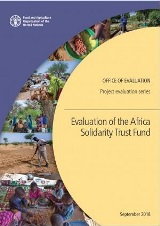
Evaluation of the Africa Solidarity Trust Fund
26/09/2018
The Africa Solidarity Trust Fund (ASTF) is a funding vehicle for the pursuit of joint and coordinated action to defeat hunger and malnutrition, improve the livelihood of farmers, and guarantee food and nutrition security for all Africans.
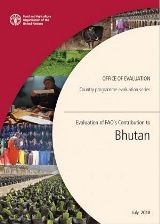
Evaluation of FAO’s Contribution to Bhutan
26/09/2018
Bhutan is a lower middle-income country whose economy is aid-dependent, import-driven and vulnerable to shocks. The heavy reliance on export of hydroelectricity does not create broad-based employment. Bhutan’s narrow economic base and importance of the Renewable Natural Resources (RNR) put FAO in a unique position of contributing to the country’s...
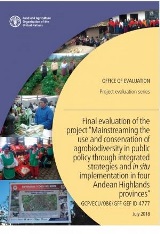
Final evaluation of the project “Mainstreaming the use and conservation of agrobiodiversity in public policy through integrated strategies and in situ implementation in four Andean Highlands provinces”
24/08/2018
Ecuador has been recognized as one of the 17 megadiverse countries in the world. It present a great variety of native crops preserved thanks to traditional agricultural practices of indigenous communities. The GEF-funded project “Integrate the use and conservation of agro-biodiversity in public policies” sought to overcome the many threats...
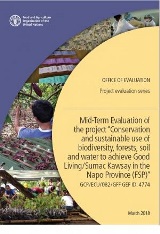
Mid-Term Evaluation of the project “Conservation and sustainable use of biodiversity, forests, soil and water to achieve Good Living/Sumac Kawsay in the Napo Province (FSP)”
24/08/2018
Ecuador has been recognized as one of the 17 megadiverse countries in the world. The Napo province presents 19 of the 91 ecosystems reported for Ecuador. With an integrated approach, the GEF-funded project “Conservation and sustainable use of biodiversity, forests, soil and water to achieve good living (Sumac Kawsay)” sought to overcome the many threats affecting biodiversity while reducing rural poverty.
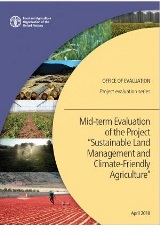
Mid-term Evaluation of the Project “Sustainable Land Management and Climate-Friendly Agriculture”
10/08/2018
The “Sustainable Land Management and Climate-Friendly Agriculture” Project was implemented in Turkey to improve the sustainability of agricultural and forest land use in the area by rehabilitating degraded forests and rangelands, promoting climate-smart agriculture and establishing a favourable enabling environment.
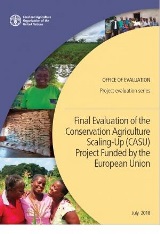
Final Evaluation of the Conservation Agriculture Scaling-Up (CASU) Project Funded by the European Union
06/08/2018
Despite widespread promotion of conservation agriculture in Zambia as a means to increase productivity and conserve soil fertility in farming systems, there has been limited adoption by farmers of such techniques. This project had the objective of sustainably increasing crop productivity and diversity through widespread promotion of the three principles of conservation agriculture across the entire country.
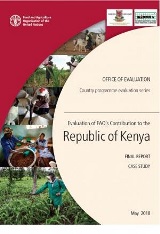
Evaluation of FAO’s Contribution to the Republic of Kenya
31/07/2018
The purpose of FAO’s Country Programme Evaluation (CPE) in Kenya was to provide feedback to better orient the Organization’s programme with a view to making future Country Programming Frameworks (CPF) more impactful and relevant to the needs of the country.
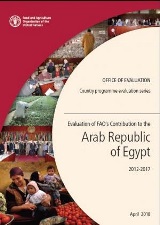
Evaluation of FAO’s Contribution to the Arab Republic of Egypt 2012-2017
22/06/2018
Egypt experienced instable political situation during the past years. As a result, its food security was heavily affected. FAO’s programme focused on sustainable agricultural development for food security and nutrition. Enhancing food security also requires addressing socio-economic aspects, particularly the role of women.
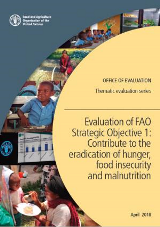
Evaluation of FAO’s contribution to the eradication of hunger, food insecurity and malnutrition (SO1)
10/05/2018
FAO’s Strategic Objective 1 (SO1) is to “contribute to the eradication of hunger, food insecurity and malnutrition”. The evaluation examined the value added of SO1 to FAO’s efforts to promote food and nutrition security at the global, regional, and national levels from 2014 to 2017.
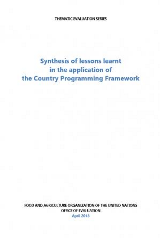
Synthesis of lessons learnt in the application of the Country Programming Framework
09/05/2018
The objective of this synthesis is to examine the effectiveness of FAO’s Country Programme Framework (CPF) as a management tool for country-level programming, based on the findings from Country Programme Evaluations conducted by OED and other sources. It presents evidence on best practices, lessons learned and challenges related to planning, implementing, monitoring and evaluation of country programmes, and suggest a set of recommendations for enhancing the effectiveness of the CPFs.
